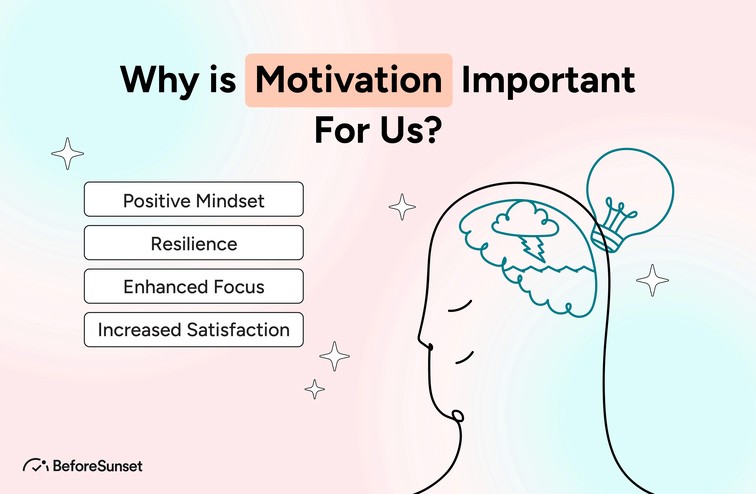A dynamic force, motivation is the foundation of almost all human behavior and accomplishment. It acts as the catalyst that encourages us to make plans, take initiative, and persevere in the face of difficulties. Gaining an understanding of the significance of motivation is essential to understanding the factors that propel individual and group achievements.
In addition to affecting our day-to-day choices and actions, motivation also determines our long-term goals and the courses we decide to take. Motivation is a driving force that strengthens our will and fortitude in a variety of contexts, including the pursuit of personal objectives and the dynamics of cooperation and collaboration.
Analyzing motivation's importance reveals how deeply it affects our lives entire fabric, well-being, goal achievement, and personal growth. Essentially, the blog of why motivation is important to us goes into the basic components that drive us toward development, achievement, and a happy life.

Intrinsic and Extrinsic Motivation
Human behavior is driven by motivation, which may be generally divided into two categories: extrinsic motivation and internal motivation. The internal forces that encourage people to participate in an activity for their own intrinsic fulfillment and personal happiness are referred to as intrinsic motivation.
Curiosity, innate interests, or a quest for mastery are the sources of this kind of motivation. Conversely, extrinsic motivation refers to the use of outside forces, such as incentives, acknowledgment, or penalties, to influence conduct.
Extrinsic motivators look for rewards from outside sources or material possessions for their efforts. Comprehending the dynamic between these two types of motivation is essential to understanding the intricate processes that impact human conduct, and determining how people approach activities, establish objectives, and find fulfillment in their endeavors.
Types of Intrinsic Motivation
There are many different types of intrinsic motivation that come from within people. A fundamental kind, curiosity stimulates an innate want to learn about and make sense of the world, leading to an ongoing pursuit of knowledge.
Another important aspect is autonomy, which is the innate drive for independence and self-direction. People who have autonomy feel joy in making their own decisions. The quest for skill growth and the joy that comes from improving one's talents are at the heart of mastery as a kind of intrinsic motivation.
To further impart a deep feeling of fulfillment and meaning, the intrinsic motivation of purpose also entails coordinating actions with one's values and sense of service to something bigger than oneself. These many forms of intrinsic motivation draw attention to the inner motivations that propel people to pursue their goals, stick with them, and feel satisfied doing so.
Types of Extrinsic Motivation
Behavior that is influenced by outside forces, such as incentives, penalties, or recognition, is known as extrinsic motivation. Tangible incentives, like cash or awards, are strong extrinsic motivators that encourage people to participate in activities more for the expected advantages to themselves than for their own intrinsic delight.
A further form of extrinsic motivation is social recognition and praise when people are motivated by the need to be accepted and acknowledged by others. Extrinsic motivators can also be triggered by fear of bad consequences, such as criticism or punishment, which makes people avoid undesired outcomes.
Extrinsic motivators that influence behavior include promotions in the job and grades in academic settings. Extrinsic motivation may be a powerful force for driving behavior, but if the external danger or reward is eliminated, it may become less powerful.
This emphasizes the need to strike a balance between intrinsic and extrinsic motivating variables in order to maintain engagement and pleasure.

Benefits of Intrinsic and Extrinsic Motivation
Extrinsic and intrinsic motivation have different advantages, and a mix of the two can help influence behavior and provide the best results.
Benefits of Intrinsic Motivation:
Sustainable Engagement: People who are motivated by intrinsic factors are more likely to stay engaged for a longer period of time since they get enjoyment and satisfaction from the activity itself.
Enhanced Creativity: When people are motivated by their own interests and passions, they are more willing to explore and experiment, which frequently leads to creativity and invention.
Enhanced Learning: People who possess intrinsic motivation are more likely to actively seek out and retain knowledge, which results in a more profound and significant comprehension of the subject matter.
Increased Sense of Mastery: The pursuit of mastery and intrinsic motivation are strongly related, enabling people to grow in confidence and sense of competence as they advance in their abilities.
Personal Satisfaction: When people pursue activities that are in line with their beliefs and interests, they develop a feeling of purpose and experience a higher degree of personal happiness and well-being.
Benefits of Extrinsic Motivation:
Behavioral Regulation: By providing external rewards or penalties that direct people toward desired behaviors or results, extrinsic motivation offers a systematic framework for behavioral control.
Goal Attainment: External incentives, like money or recognition, may be quite effective in motivating people to work hard and stick with their efforts in order to accomplish particular goals.
Efficiency Gains: By establishing a distinct connection between effort and reward, extrinsic motivation may boost efficiency by motivating people to concentrate on their work and complete goals on schedule.
Competition and Achievement: People are often motivated to surpass their peers and attain greater levels of achievement because they feel a feeling of competitiveness that is fostered by external rewards and recognition.
Adaptability: When there are immediate incentives or penalties, extrinsic motivators can operate as temporary catalysts to start an action or change in situations where intrinsic motivation may be missing.
Professional Development and Human Motivation
Human motivation and professional development are related concepts that are essential to an individual's success and personal development at work. Professional development is the intentional and ongoing process of improving one's abilities, knowledge, and skills in order to progress one's profession and achieve personal fulfillment.
Human motivation, on the other hand, is what propels a person's activities and endeavors. A key element of successful professional development techniques is comprehending and utilizing motivation.
Professional Development in Relation to Human Motivation
Human motivation and professional growth are two intertwined characteristics of the workplace that reinforce and influence one another. Initiatives for professional development, such as seminars, training courses, and chances to hone skills, act as accelerators for development and career progression.
However, the underlying motivating elements that encourage people to actively engage and invest in their personal growth have a significant impact on these efforts' effectiveness.
Extrinsic or intrinsic human motivation is a major factor in determining how well professional development initiatives work. People who are motivated by their own interests, passions, or sense of purpose are more likely to actively seek out educational possibilities.
Because they are motivated by a desire for mastery and ongoing growth, motivated employees who find purpose and happiness in their jobs are frequently more likely to voluntarily participate in professional development.
However, extrinsic motivators—like pay raises, promotions, or recognition—can offer concrete rewards that motivate people to take part in professional development initiatives.
The extrinsic motivation theory, which holds that people are motivated by outside forces to accomplish particular goals or progress in their professions, is consistent with the concept of external incentives.
Programs for professional growth that are successful recognize and make use of both internal and external motivators. Authentic passion for learning and progress may be fostered by businesses by connecting development opportunities with employees' own objectives, interests, and values.
This allows for the utilization of intrinsic motivation. In addition, extrinsic motivators may be strategically used to supplement intrinsic motivations by offering extra rewards like professional growth routes or recognition programs.
Human motivation and professional growth have a dynamic and cyclical relationship. When people are involved in meaningful professional growth, they are likely to feel more competent and accomplished, which will further enhance their intrinsic drive.
An increase in motivation leads to a more contented and productive workforce, which creates a positive feedback loop that is advantageous to both individuals and companies. In order to foster a culture of ongoing learning, creativity, and job happiness, it is critical to comprehend and take advantage of the complex relationship that exists between professional development and human motivation as workplaces change.

Benefits of Professional Development for Employee Motivation
Workplace professional development programs provide a host of advantages that greatly boost employee motivation. First of all, by giving staff members chances to improve their abilities and expertise, these programs help them feel competent and in control of their work.
People are more self-assured and intrinsically motivated when they feel competent and skilled in their positions because they can see how they can make a significant contribution to the company.
Professional development also supports workers' goals for advancement in their careers. Having clear career advancement and skill-development paths shows that the company appreciates its employees, which boosts workplace motivation and job satisfaction. Employees are strongly motivated to actively participate in learning opportunities when they see themselves gaining new skills or taking on more difficult tasks.
Furthermore, by encouraging a growth mentality, professional development adds to a healthy workplace environment. Investing in continuous learning conveys to employees that growth and progress are priorities that never stop.
This can provide workers with a feeling of direction, and motivated workers are more likely to believe that their personal and professional growth is in line with the organization's overarching objectives.
Extrinsic motivators are also relevant since advancement in one's career might be connected to material benefits like pay raises, promotions, or recognition. There is an external motivation for employees to actively engage in training and skill-building activities since there is a definite link between investing in one's growth and possible career rewards.
Professional development options also help workers keep up to date in their industries, which adds to their feeling of security in their jobs and relevance. Rapid industry evolution necessitates the capacity to adapt and learn new things. As it raises the perceived worth of the employee's contribution to the company, knowing that the organization helps people remain ahead of market trends may be a powerful extrinsic motivation.
Theories of Organizational Goals and Common Goals
The pursuit and accomplishment of organizational objectives are essential to any business's success and long-term viability. Theories of organizational goals offer structures and perspectives on how companies and establishments may efficiently establish, rank, and accomplish goals.
These theories, which have their roots in management and organizational behavior research, provide insightful viewpoints on the strategic planning and decision-making procedures that determine an organization's course. Simultaneously, it is critical to comprehend shared goals in an organizational setting as it entails identifying and coordinating common goals among many stakeholders.

Theories that Explain Organizational Goals
Our knowledge of organizational goals is aided by a number of theories, which offer frameworks for understanding how objectives are set, communicated, and accomplished within the intricate systems of many organizations.
The Goal Setting idea is a well-known idea that suggests setting clear, difficult goals can improve performance by inspiring both people and groups. This idea emphasizes how crucial objectives should be both challenging and clear, as well as how dedication and feedback systems are essential for success.
The holistic strategy known as Management by Objectives (MBO), which includes managers and employees working together to set, discuss, and track goals, is equally important.
MBO places a strong emphasis on goal alignment across the whole business, making sure that team and individual objectives are in line with the larger corporate goals. This philosophy encourages goal-setting through participation, giving workers a sense of commitment and responsibility.
The firm's Resource-Based View (RBV) is another pertinent viewpoint. RBV suggests that the efficient use of special and valued resources leads to a persistent competitive advantage, even if it is not a theory of organizational objectives per se. Within the framework of goals, firms may establish targets that capitalize on their unique competencies, guaranteeing congruence between objectives and the internal resources required to achieve them.
Institutional Theory also emphasizes how outside factors affect organizational behavior, particularly goal-setting. In order to comply with institutional norms and public expectations, organizations frequently set goals and procedures. This idea acknowledges that in order for an organization to become legitimate and accepted, external forces may also have an impact on the goals it sets.
Common Goals That Impact Workplace Performance and Efficiency
Setting shared objectives that influence productivity and performance at work is essential to creating a high-functioning, integrated corporate environment. client satisfaction goals inspire teams to provide outstanding goods and services, fostering recurring business and client loyalty.
In order to improve total organizational efficiency, the pursuit of innovation and adaptation fosters a dynamic work culture where people are encouraged to think creatively and quickly adjust to changes. Putting employee engagement and happiness first fosters a good work environment that boosts output and teamwork.
The success of the company is directly impacted by teams striving for operational excellence, which motivates them to streamline workflow, cut down on inefficiencies, and optimize procedures. The organization's financial stability and well-being are ensured by financial goals including cost reduction and revenue development.
Objectives of quality improvement, diversity and inclusion, and environmental and social responsibility also add to an all-encompassing strategy that improves productivity, standing, and long-term success in the workplace. When these shared objectives are accepted by everybody, teams may use them as a guide to coordinate their efforts, increase productivity, and support the organization's success as a whole.
BeforeSunset AI For Motivation
Do you need motivation? Look no further BeforeSunset AI is here. With BeforeSunset AI, planning your day has never been easier. What are you waiting for? Try it out today!


